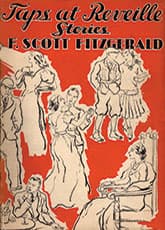Babylon Revisited
Critique • Quotes
 First edition collection, 1935
First edition collection, 1935First publication
1931 in The Saturday Evening Post magazine
First book publication
1935 in Taps at Reveille collection
Literature form
Story
Genre
Literary
Writing language
English
Author's country
United States
Length
Approx. 8,000 words
Recovering from the past
The beginning of F. Scott Fitzgerald's story "Babylon Revisited" with an expatriate American visiting Paris, scene of his carousing in the 1920s and now deserted by the old gang, first put me in mind of Ernest Hemingway's look back at that era in A Moveable Feast (1964). The American in the short story is obviously a stand-in for Fitzgerald himself, though purportedly a businessman rather than a writer.
But it quickly became clear this is not a nostalgic trip back. It's a story of regret, an attempt to recover not the past but a small part what was lost then.
If you're reading Fitzgerald chronologically you will have become used to his stories of lost love and young dreams, often dwelling on the passing of the post-war Jazz Age of which he had been the prime chronicler, or of his pre-war adolescence. In those novels and stories, Fitzgerald has displayed a fine ambivalence, critiquing the superficialities of those times while seemingly bemoaning their fleetingness. It's similar to the complicated attitude he's shown to wealth and social status, a theme that has also run through those earlier works (reaching its peak in The Great Gatsby).
But Babylon Revisited is different. Not too far into the story, you get a welcome inkling of a more mature outlook.
It's a year or so into the Great Depression to which Charlie Wales lost his fortune but, as he later tells a bartender, he really lost everything important during the high times before the Crash. He has no desire to relive them. Quite the opposite. And when he does run into a couple of hangers-on from the halcyon days he avoids them. He's in Paris for a much more serious undertaking: to reclaim his daughter who had been left with his in-laws after the death of his wife.
What was lost and won
They consider Wales an alcoholic and he tries to impress upon them he is sober now. His sister-in-law in particular blames him for having destroyed her spotless sister and, though the true story is more complex than that, he swallows his pride and refuses to get into an argument over it, keeping his end goal in sight.
Even if you haven't read previous Fitzgerald or are not aware of its context of time and place, this story of the previously errant father trying to walk the straight and narrow to win custody of his child can absorb you. Scenes between the father and in-laws are quietly gripping and those between father and daughter are truly moving. The dialogue is some of the simplest, yet most expressive, Fitzgerald has written to this point.
Despite falling out of popularity by the time of writing, Fitzgerald is at the height of his story-telling powers. The story is one of his perfectly plotted little masterpieces, almost a compressed novel. He's dropped some of the cleverness and fanciful writing of earlier work as he moves toward a more unadorned narrative style, all the better to get across the more universal emotional content of the story.
For those unaware of the story's place in Fitzgerald's oeuvre though, the twenty pages or so of Babylon Revisited are full of little notes that reveal how the times have changed and how the author has himself evolved. In his mid-thirties, the boy has grown up.
— Eric
Critique • Quotes

